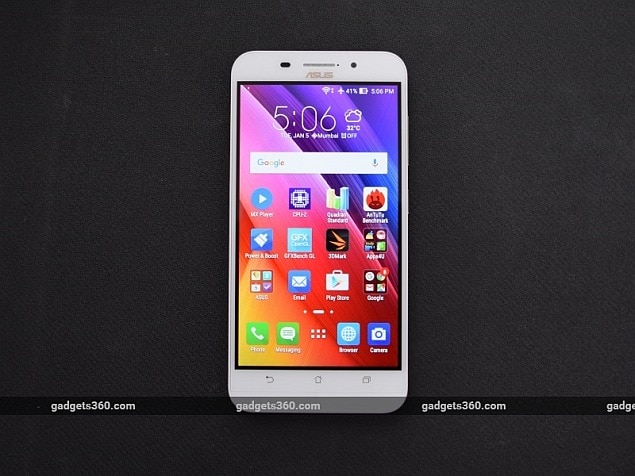No company wants to miss this trend. Now Asus has Zenfone Max Zenfone Max was launched in August last year. It is priced at Rs 9,999 and comes with a 5000 mAh battery. It is much cheaper than the Marathon M5 and Lenovo Vibe P1 and its specifications are like a mid-range handset. Is Zenfone Max the best battery power Android smartphone? Let’s find out.
Look and design
Asus’ Zenfone range of smartphones is known for its similarities. The Zenfone Max also retains this design pattern which is easily recognizable.
The Zenfone Max is available in Black and White colour variants. The White variant has a dull and smooth finish on the back panel. The Black variant has a leather-like textured finish. The 3.5mm audio socket and Micro-USB port are at the top and bottom respectively.
Asus has not tried to experiment much in Zenfone Max. The volume and power buttons are on the right side. The back panel can be removed. This is where the space for SIM and microSD card has been made. On removing the back panel, you will be able to see the battery, but it cannot be removed.
On the back panel, the speaker grill is at the bottom and the camera, flash and laser autofocus are at the top. We liked the look of the black variant more, especially its leather finish.
Asus Zenfone Max has a 5.5 inch HD resolution display. There is no shortage in this handset in terms of brightness and color, but due to low pixel density, the lack of detail and sharpness is clearly visible. However, for those users who are more concerned about battery life, this screen is sufficient.
The charger that comes with Asus Zenfone Max is nowhere near enough for the battery of this phone. It takes more than 5 hours to charge the phone’s battery from 0 to 100 percent. According to us, the company should have provided a fast charging feature. We would suggest that you also buy a reliable fast charger for Zenfone Max.
Specifications and software
On paper, the specifications of Asus Zenfone Max are the same as the cheaper Zenfone 2 Laser (ZE550KL) variant. The only difference is the bigger battery. It has Qualcomm Snapdragon 410 chipset, 2GB RAM, 16GB inbuilt storage and dual-SIM connectivity. The primary SIM slot supports 4G networks and the other supports 3G. It can use a microSD card up to 64GB.
The 5000mAh battery in the Max is bigger than the 3000mAh battery in the Zenfone Laser. This along with the Snapdragon 410 chipset and HD screen, gives hope of better battery life.
Asus Zenfone Max runs on Android Lollipop 5.0, on top of which the company’s ZenUI has been used. We have told you earlier that this skin is a better interface in terms of user experience. You also have many options for customization.
Sadly, there are still a lot of Asus apps in the interface. This leads to around 50 apps starting to update as soon as you turn the phone on.
Camera
The similarities between Asus Zenfone 2 Laser and Zenfone Max are not limited to specifications. Max also uses 13 megapixel cameras and laser autofocus system. It also has a 5 megapixel front camera. Both cameras can record 1080 pixel videos. Dual-tone LED flash is also provided with the rear camera. In this way, Zenfone Max is a bigger battery variant of Zenfone 2 Laser.
There is no change in the camera app as well. It is similar to other Asus devices. There are many options of camera modes and manual settings for photos and videos. It can be a bit complicated for some people, but the auto mode makes things easier. Apart from this, it is very easy to switch video recording, flash and camera from the default screen.
As expected, its camera performance is also quite similar to that of the Asus Zenfone 2 Laser. Indoor photos are decent, but in too much light and darkness the images get washed out. If there is too much sunlight the images look completely white.
The laser autofocus system works well in close-up shots and indoor shots. It focuses on the subject quickly and accurately. The performance of the front camera is satisfactory. Overall, the camera is competent indoors, but the shortcomings are clearly visible outdoors.
Performance
Even though the Asus Zenfone Max has a budget chipset and its specifications are quite basic, the company has put together a great performer. Games like Dead Trigger 2 and Real Racing 3 ran smoothly. The phone heated up less than expected while playing games. Our test videos also played smoothly. There was no lag while using the interface. The benchmark results of this handset are quite similar to those of the Asus Zenfone 2 Laser.
Call quality on the phone was good. Its battery lasted for 25 hours in our video loop test. In normal use, the phone’s battery will last for three to four days without charging.
Our verdict
With more and more users becoming increasingly concerned about battery life, the idea of making smartphones with bigger batteries is gaining popularity. Gionee and Lenovo have made a good attempt in this direction, but Asus has become the first company to make a 5000 mAh battery in the range of Rs 10,000. Despite being a bit heavy, the Zenfone Max retains the identity of Asus.
The design of the phone is decent. Its performance is also adequate considering the price. Its primary camera is good and the battery life can be called excellent in this price range. Its biggest drawback is the charger. The company should have provided a quick charger with it. If you want to buy a budget smartphone with great battery life then Asus Zenfone Max is a great option.
